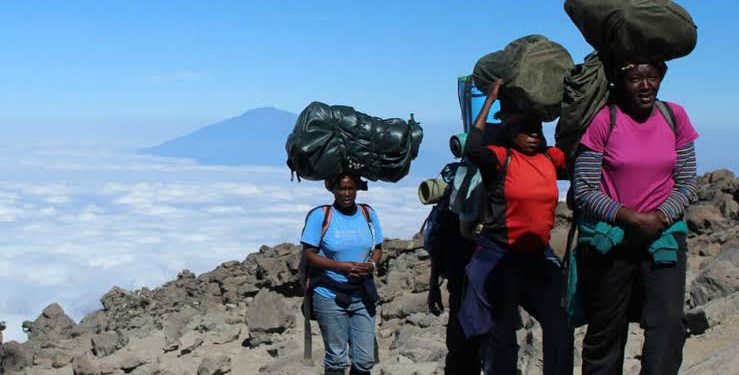Pitching tents, carrying luggage, porters are vital for tourists and mountaineers to climb Africa’s Kilimanjaro peak
MARANGU, Tanzania
Porters who help mountaineers to scale Tanzania’s Mount Kilimanjaro are demanding better wages to attend to health issues caused by high altitude sickness.
With a height of 5,895 meters (19,341 feet), Mount Kilimanjaro is the tallest mountain in Africa and the fourth most topographically prominent peak on Earth.
It attracts thousands of adventure tourists and mountaineers every year, who scale its peak and experience volcanic slopes, braving low oxygen levels in the atmosphere.
The porters, mostly local men between the ages of 18-40 are hired by tourists and mountaineers to accompany them to the peak by carrying baggage and other camping paraphernalia.
Speaking to Anadolu Agency, Magnus Temu, a porter said the low wages, mean a hand-to-mouth existence for his family. He said the tour operators were taking advantage of the verbal contract to deny them dues.
He said porters working for different tour operating firms have been serving tourists, by keeping them safe, hydrated besides arranging food and shelter.
According to Kilimanjaro National Park Authority (KINAPA), the daily wages of porters are fixed at $10 a day and they can carry only 20 kilograms of weight on the head.
However, porters told Anadolu Agency that they are forced to carry much more weight and are paid much lesser wages than fixed by the government. Some are paid as little as $6 a day. Even the tips collected from tourists are taken away by the tour guides at the instruction of the tour company, allege porters.
“I don’t have any contract with the company, so I cannot refuse what they decide to pay me. If I had a contract I would furiously demand to be paid as required,” said Raphael Masawe, another porter.
Little earning
Each morning after hikers leave the camp, Temu stays to wrap up the camp, carries the heavy equipment, and pitches the next camp much before the visitors arrive there.
“I also prepare meals and boil water before the guest arrives. I have to make them feel comfortable,” said Temu.
Despite experiencing fatigue and exhaustion, he hardly earns enough to meet the growing needs of his family.
“My survival very much depends on the kindness of the tourist who often gives a little token of appreciation,” he said.
Tourism is one of the cornerstones of Tanzania’s economy, contributing about 17.2% to the country’s gross domestic product and 25% of all foreign exchange revenues.
The sector, which provides direct employment for more than 600,000 people, generated approximately $2.4 billion in 2018, according to government statistics.
Each morning hundreds of porters are huddled at the Kilimanjaro national park gate, expecting the tourists to hire them.
Porters say, most of them do not have permanent contracts with tour companies, as a result, they often end up getting paid less than what is required by the law.
Tanzania Porters Organisation—an umbrella body working to promote the welfare and rights of porters, said the porters often work in harsh conditions which threaten their lives.
“Most porters do not have binding contracts with tour firms, which makes it hard to demand their rights,” said Loshiye Mollel, the secretary of the organization.
Porters also complain that tour operators do not provide them with warm clothing and sleeping bags. Some of them even do not have the proper footwear to navigate the terrain.
Government warns operators
Sirili Akko, chief executive officer of the Tanzania Association of Tour Operators, said the majority of his members do pay porters above the recommended rates. But he admitted that some firms do not pay porters properly, thereby forcing them to rely on tips.
Responding to a question in parliament, Tanzania’s Deputy Tourism Minister Mary Masanja said the government is preparing a guideline for tour companies to pay porters fairly.
“We ask tour operators to pay porters according to approved rates. Whoever is going against will be taken to task,” she said.
After the minister’s statement, the government threatened to revoke licenses of those tour operators, who treat porters unfairly. But porters say, so far there has been no turnaround in their lives.
Hikers appreciate the resilience of porters and the help they render while scaling the peak.
“This is my first time climbing the mountain. The experience was awesome. With the help of a guide and porters, I was able to reach the peak. They do a fantastic job,” said Penile Sigmfeldt, a Swedish tourist.
She said the porters deserve to be paid better salaries as it is not possible to scale the mountain without their assistance.






